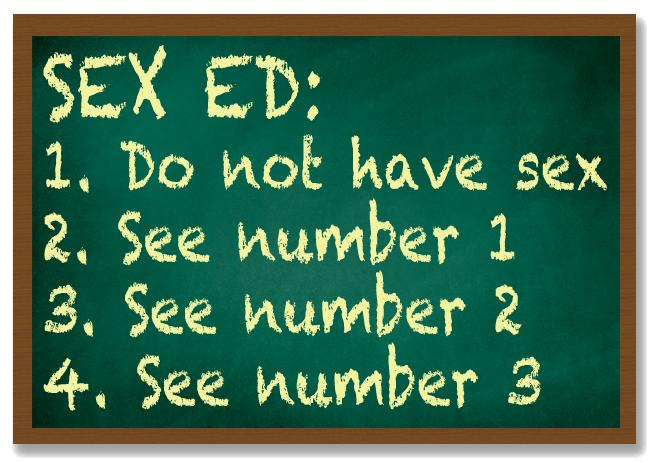Keep the sex in high school sex education


Jordan Mondell | Layout Editor
The birds do it, the bees do it, we do it — so why can’t we talk about it?
Sex talk makes some people uncomfortable. But comprehensive sexual education shouldn’t. Sex ed addresses the root issues of making healthy personal and sexual choices, and this type of education is widely effective at producing graduates who are actually knowledgeable about a variety of issues related to sex.
Throughout most of history, Western cultural norms meant that it was the parents’ responsibility to teach their children about sex. But personal beliefs, combined with rapidly changing medical information, left this at-home education lacking, and many people saw sexual education in public schools as the solution. Unfortunately, this movement still hasn’t brought an end to poor sexual health and education.
Widespread reluctance to provide all students with a comprehensive sexual education has proven to be just as detrimental as not providing students with sexual education at all.
It wasn’t until the late 1800s, following epidemics of syphilis and cholera, that movements for organized health and sexual education began in the United States. After gaining White House support, educators introduced sexual education into high schools as a health and family planning curriculum that included information about both reproduction and general sexual health. At the time, the public was highly accepting of school-based sexual education. People believed that risk prevention information — about contraception and sexual safety — should be readily available.
But as sex ed began to move out of the household and into the schoolhouse, many conservative groups began to more strongly oppose sex ed. If children were taught about sexual intercourse, people thought they would be more likely to engage in it at a younger age.
Instead of requiring courses on how to maintain sexual health, state sex education policies began mandating abstinence-only courses instead. We’ve seen the “Mean Girls” scene where the gym teacher tells students that if they have sex, they’ll die. In a less dramatic fashion, these courses teach students that in order to prevent the negative consequences of sexual intercourse, such as sexually transmitted infections and unwanted pregnancy, they must refrain from engaging in sex until after marriage. Twenty states, including Pennsylvania, voted to restrict or abolish sex ed policies by 1975.
Today, the state of sex ed in states across the country is largely inconsistent and erratic, with no standards mandated on the federal level and curriculums varying wildly from state to state. Twenty-six states require that teachers stress abstinence, while only 18 mandate sex ed that includes information about birth control. And a mere 13 require that the information taught in these programs be medically accurate.
Despite legislation to the contrary, scientific evidence overwhelmingly shows that these abstinence programs do not change teen sexual behavior. Debra Hauser, president of Washington, D.C., think tank Advocates for Youth, conducted a study in 2003 that found that Pennsylvania’s state-sponsored programs were largely ineffective in delaying sexual intercourse or promoting skills and attitudes consistent with sexual abstinence. In another study, researchers found that individuals who made “virginity pledges,” a common element of abstinence programs, were one-third less likely to use contraceptives when becoming sexually active than their peers who did not make the pledge.
Though abstinence itself is an effective method of avoiding unwanted pregnancy and STIs, most abstinence-only programs are ineffective and misleading. Comprehensive sexual education includes age-appropriate, medically accurate information on a broad set of topics related to sexuality including relationships, abstinence, contraception and disease prevention. Pennsylvania’s current sexual education policy does not ensure students are fully educated on any of these topics.
According to a study from Douglas Kirby of the National Campaign to End Teen and Unplanned Pregnancy, comprehensive sex ed programs tended to delay sexual initiation, reduce the number of sexual partners and reduce the frequency of sex far more effectively than abstinence-only programs.
Not only does comprehensive sex ed more successfully reduce the rate of teen pregnancy, it can help in the fight against sexual violence. The Rape, Abuse and Incest National Network publications state that Child Protective Services agencies found strong evidence of nearly 63,000 children a year who are victims of sexual abuse — a full third of whom are under age 12.
When teens are fully informed of the signs of sexual assault and domestic abuse, they are better equipped to recognize and avoid them than they are with no education on this topic. By the time they get to college, they’re less likely to take risks with their own — and their partners’ — health.
Abstinence-only programs simply refuse to acknowledge this reality, and 2017 should be the year we put an end to them.
Elise primarily writes about education and environmental issues for The Pitt News.
Write to her at eml94@pitt.edu.
Recent Posts
Opinion | Final thoughts.
Senior staff columnist Emily O’Neil discusses her final experiences at college and how the time…
Opinion | Goodbye, Pitt
In this column, staff writer Jake Vasilias reflects on his time at Pitt.
Opinion | How to have a resisting-fascism summer
Contributing editor Emma Hannan talks about ways you can stay politically active while not in…
Who Asked? // What comes next?
This installment of Who Asked? by senior staff writer Brynn Murawski faces an uncertain future.
A Good Hill to Die On // Goodbye
In the final edition of “A Good Hill to Die On,” I decided to rant.
Review | Delayed checkouts at ‘The White Lotus’: An unoriginal third season
(Contains Spoilers) There is no meditation class, no reiki session, no nutritionally balanced, organic food…


